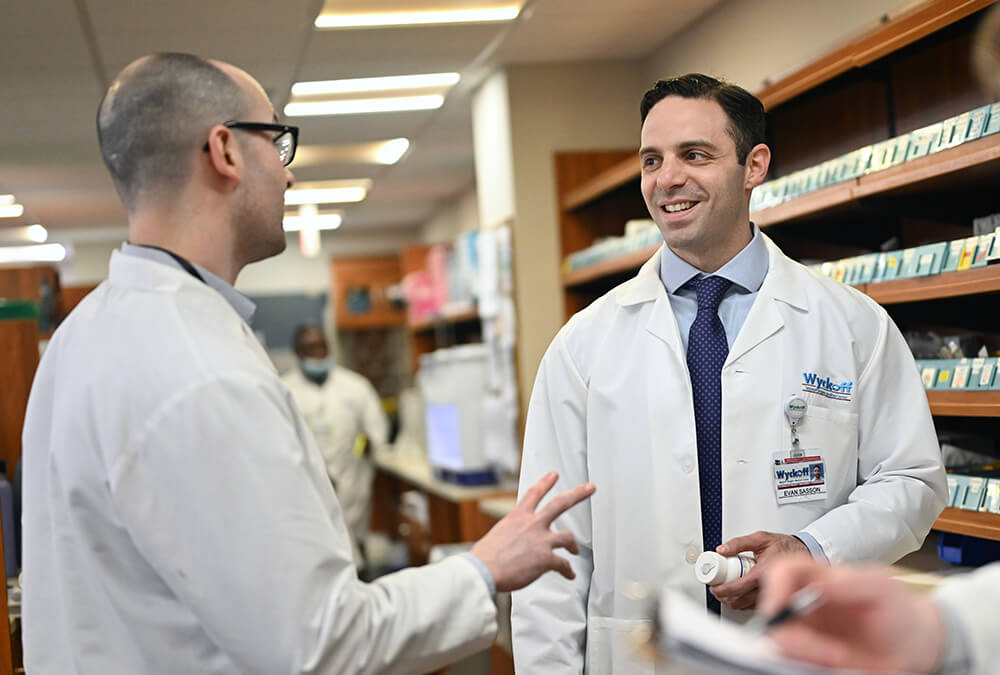The Perfect Dose
A Pharmacy School Graduate Creates the Ideal Prescription for Patient Care

Evan Sasson jokes that “despite my mother’s wishes, I became a pharmacist instead of a doctor.”
Certainly, the disappointment has been eclipsed by pride for Mrs. Sasson by what her son has accomplished with his degree. Today, Sasson is the associate director of pharmacotherapy services and the residency program at Wyckoff Heights Medical Center in Bushwick, New York.
In fact, there was no such program at Wyckoff until Sasson played a key role in creating it.
Sasson, who has extensive clinical pharmacy experience in cardiology and ambulatory care services, worked during pharmacy school at a drugstore chain. “I realized early on I wanted more interaction with patients rather than just filling and handing prescriptions over and filling the next one,” says Sasson, 37, who graduated from Touro College of Pharmacy in 2014. “I always preach to my residents what I learned at Touro, to explore all the options available through a pharmacy degree.”
Touro College of Pharmacy is known for a curriculum steeped in real-world experience, something that appealed to Sasson. Lots of time in the classroom doing the crucial academic learning, but more time perhaps, than any other such school, Touro pharmacy students are required to work in hospitals, drugstores, clinics and other healthcare agencies. “We spent a lot of our time practicing, experiencing and enhancing what we learned in school,” says Sasson, who lives in Williamsburg, Brooklyn and counters his long workdays by practicing martial arts. “We were encouraged to explore all the possible areas of pharmacy careers we could pursue.”
Sasson was drawn from the start to interacting with patients, helping them understand what medications worked best and how they affected their systems. During his student rotations, Sasson thought a patient needed a higher dose of antibiotics than prescribed. He spoke with the doctor, who agreed and increased the dose. “I still remember how gratifying it felt to know that the doctor listened, and that the patient would get better quicker,” he says.
Prior to moving to Wyckoff, Sasson was at Brooklyn Hospital Center. There, he served as a clinical pharmacist as well as director of the post-graduate year one program. Under his leadership, the program thrived, creating top-notch pharmacy practitioners and enhancing patient care in numerous ways, including developing mutually respectful communication between pharmacotherapists and physicians.
All invaluable experience, when in March 2022, Sasson was tapped to create a residency program at Wyckoff. “It was from the ground up and it was hard and rewarding and worth every minute of work,” he says. “The hospital had never had pharmacy residents. That’s the first steppingstone for a direct patient care role. That’s important in many ways. For residents, it’s immeasurable experience in patient care, and for patients it elevates their level of care and decision-making. Most important for residents, patients and doctors
in a small community hospital, there is now access to pharmacists right there as part of an in-house team.”
Sasson also took the lead in a collaborative drug therapy management agreement between the pharmacy and Wyckoff’s medical department. That gives Sasson and other clinical pharmacotherapists prescribing privileges, the ability to order labs and document notes in medical charts. What’s more, the agreement established pharmacist-run outpatient clinics. “All of this,” Sasson says, proudly, “was new to Wyckoff Heights Medical Center.”
Thanks in large part to Sasson’s work, the pharmacy program at Wyckoff has been reviewed and accredited and is set to be expanded in 2024. He administers the program, but the day-to-day demands of getting it up and going have subsided. He is back to practicing both his specialty and favorite area of pharmacotherapy, as part of the hospital’s cardiac team, helping to care for patients with heart ailments. Sasson may not be a cardiologist, but he is an invaluable part of a life-saving team. What’s more, as his success and job satisfaction grow exponentially, Sasson’s mother has mellowed—a bit: “She’d probably still prefer I went to medical school,” he says, laughing, “but I know she’s proud of me.”

